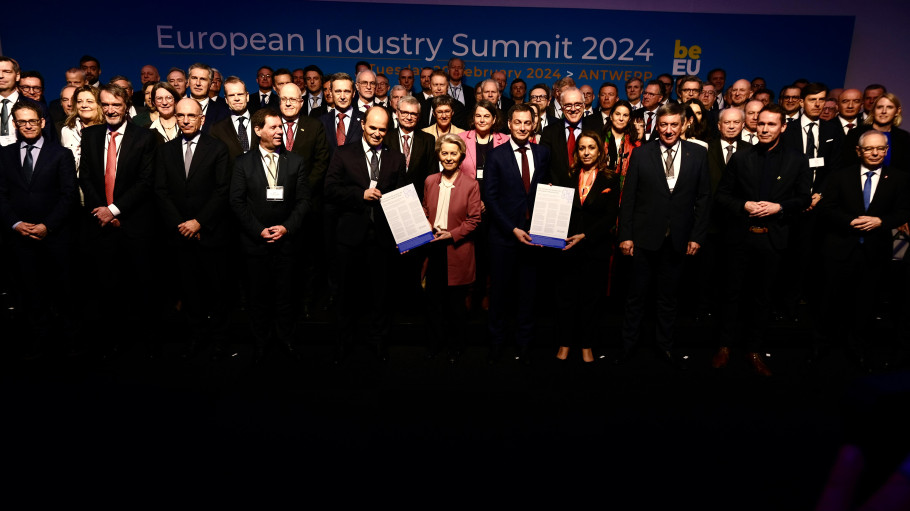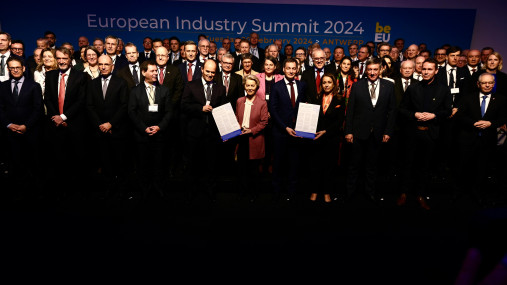
Press releases » Antwerp Declaration for a European Industrial Deal - Industry leaders call for 10 urgent actions to restore competitiveness and keep good jobs in Europe
Antwerp Declaration for a European Industrial Deal - Industry leaders call for 10 urgent actions to restore competitiveness and keep good jobs in Europe
Downloads and links
Recent updates

Antwerp, 20 February 2024 – Today 73 industry leaders spanning almost 20 industrial sectors presented ‘The Antwerp Declaration for a European Industrial Deal’ to Belgian Prime Minister, Alexander De Croo and Commission President, Ursula von der Leyen. The declaration underlines the commitment of industry to Europe and its transformation and outlines urgent industry needs to make Europe competitive, resilient, and sustainable in the face of dire economic conditions.
During a European Industry Summit held on the site of BASF in Antwerp, leaders from basic industry sectors, representing 7.8 million workers in Europe, joined forces with European trade unions and European leaders to address pressing concerns regarding Europe's industrial landscape. The ‘Antwerp Declaration’, supported by a wide range of sectors, emphasises the critical importance of clarity, predictability, and confidence in Europe's industrial policy.
Signatories of the Declaration include representatives from diverse sectors, including steel and ranging from chemicals, pharmaceuticals, paper, mining, aluminium, glass, zinc, metals, textiles, refineries, cement, lime, fertilisers, ceramics, industrial gases and biotech.
“We call on the EU institutions to urgently put in place a European Industrial Deal and create an investment-friendly framework for a successful transition. In the current geopolitical and economic circumstances, the time to act is now or never. Europe can only be stronger with an industrial base in Europe”, said Axel Eggert, Director General of the European Steel Association (EUROFER) on the occasion of the signature of the Antwerp Declaration.
“We need to address three vital challenges: energy, investment and trade. First of all, we need access to affordable and abundant clean energy. Second, we need a solid business case to successfully invest in decarbonisation projects. Third, we need a robust trade policy to ensure the level playing field of European manufacturing. If we want to avoid dependence on third countries, deindustrialisation and loss of quality jobs, we must keep our steel industry – which is the backbone of most value chains, including clean tech - in Europe and allow it to thrive and being competitive on global markets”, stressed Mr. Eggert.
To overcome the challenges, the declaration outlines 10 concrete actions, including integrating the EU Industrial Deal into the broader European Strategic Agenda, streamlining legislation, and simplifying the State Aid framework. It calls to transform Europe into a global leader in providing abundant and affordable low-carbon energy through strategic partnerships and robust infrastructure, alongside a stronger support for EU projects. It emphasises the need to ensure raw material self-sufficiency, foster demand for sustainable products, and nurture innovation. Europe’s Single Market is also highlighted as an asset to be leveraged and revived, along with establishing a new spirit of law-making that incentivises investments and a cohesive internal structure for effective policy implementation.
The Antwerp Declaration’ is an urgent call to revitalise Europe's industrial landscape, strengthening basic industry sectors, ensuring their competitiveness, sustainability, and resilience amid shifting geopolitics. And it underlines industry’s willingness to contribute to a stronger Europe. Only with a strong industrial fabric and a strengthened social dialogue in Europe can we ensure that the green transition is a just transition. The Declaration signifies a collaborative effort to tackle challenges and lays the groundwork for a reboot of industrial investment in Europe, marking the onset of the implementation of the European Green Deal.
Contact
Lucia Sali, Spokesperson and Head of Communications, +32 2 738 79 35, (l.sali@eurofer.eu)
About the European Steel Association (EUROFER)
EUROFER AISBL is located in Brussels and was founded in 1976. It represents the entirety of steel production in the European Union. EUROFER full members are steel companies and national steel federations throughout the EU. The major steel companies and national steel federation of Turkey, Ukraine and the United Kingdom are members.
The European Steel Association is recorded in the EU transparency register: 93038071152-83. VAT: BE0675653894. The RLE or RPM is Brussels.
About the European steel industry
The European steel industry is a world leader in innovation and environmental sustainability. It has a turnover of around €130 billion and directly employs around 306,000 highly-skilled people, producing on average 152 million tonnes of steel per year. More than 500 steel production sites across 22 EU Member States provide direct and indirect employment to millions more European citizens. Closely integrated with Europe’s manufacturing and construction industries, steel is the backbone for development, growth and employment in Europe.
Steel is the most versatile industrial material in the world. The thousands of different grades and types of steel developed by the industry make the modern world possible. Steel is 100% recyclable and therefore is a fundamental part of the circular economy. As a basic engineering material, steel is also an essential factor in the development and deployment of innovative, CO2-mitigating technologies, improving resource efficiency and fostering sustainable development in Europe.

Download files or visit links related to this content
Brussels, 26 February 2026 — Europe’s steel industry has warned that the current draft Industrial Accelerator Act could direct public support for low-carbon steel to producers outside the European Union, unless lawmakers include and tighten ‘Made in Europe’ provisions.
Brussels, 24 February 2026 - Europe’s energy-intensive industries have set out a series of proposals to ensure that the EU’s upcoming Electrification Action Plan delivers on its objectives to stimulate and boost electricity consumption in industry. In a joint position paper, industries warn that persistently high electricity prices risk undermining industrial competitiveness and decarbonisation efforts. They call for a policy framework that will enable EU industry in pursuing decarbonisation and industrial competitiveness.
Energy-intensive industries (EIIs) provide direct employment to around 2.6 million people in the EU and represent the foundations of critical and strategic value chains for the EU economy and society. The current economic and energy outlook of the European Union is making investments in electrification and the continued business operation of our sectors at serious risk, should the energy-cost challenge not be solved.